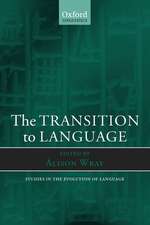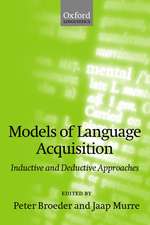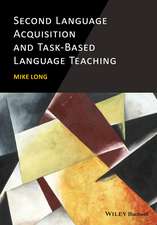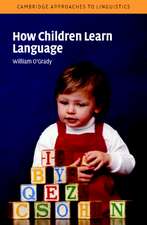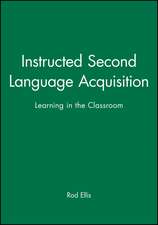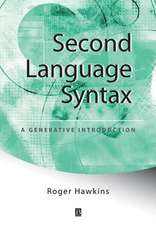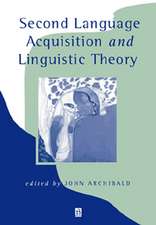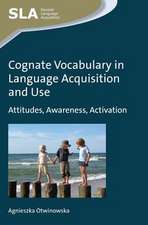Face[t]s of First Language Loss
Autor Sandra G. Kouritzinen Limba Engleză Paperback – apr 1999
Most studies of first language loss are impersonal, even when they tell emotional stories. This polyphonic book about language loss and imperfect learning of heritage languages tells the inside story. Easy to read and yet academic, it gives voice to five different storytellers who relate the histories of their first language loss and analyzes themes from 21 life-history case studies of adults who had lost their first languages while learning English. The stories in this book make a compelling argument that heritage languages should be preserved, that ESL should be about developing bilinguals not English monolinguals.
Important reading for researchers, practitioners, and graduate students in ESL and bilingual education, multicultural education, cultural studies, and sociology, this book will also interest qualitative researchers as an example of a unique form of both doing and writing research.
| Toate formatele și edițiile | Preț | Express |
|---|---|---|
| Paperback (1) | 477.40 lei 6-8 săpt. | |
| Taylor & Francis – apr 1999 | 477.40 lei 6-8 săpt. | |
| Hardback (1) | 1005.73 lei 6-8 săpt. | |
| Taylor & Francis – apr 1999 | 1005.73 lei 6-8 săpt. |
Preț: 477.40 lei
Nou
Puncte Express: 716
Preț estimativ în valută:
91.36€ • 94.80$ • 76.36£
91.36€ • 94.80$ • 76.36£
Carte tipărită la comandă
Livrare economică 17-31 martie
Preluare comenzi: 021 569.72.76
Specificații
ISBN-13: 9780805831863
ISBN-10: 080583186X
Pagini: 248
Dimensiuni: 152 x 229 x 13 mm
Greutate: 0.34 kg
Ediția:1
Editura: Taylor & Francis
Colecția Routledge
Locul publicării:Oxford, United Kingdom
ISBN-10: 080583186X
Pagini: 248
Dimensiuni: 152 x 229 x 13 mm
Greutate: 0.34 kg
Ediția:1
Editura: Taylor & Francis
Colecția Routledge
Locul publicării:Oxford, United Kingdom
Public țintă
ProfessionalCuprins
Contents: Preface. Introduction. On What Pretext?: A Pre/Text for Language Loss Research. Part I: Face-Touching: A Story-Book. A Musical Interlude: Ariana: Introduction. Ariana's Story: But I'm Canadian-Born. Richard: Introduction. Richard's Story: English Is a Full-Time Job. Lara: Introduction. Lara's Story: An Outsider Looking In. Brian: Introduction. Brian's Story: Nothing Too Deep. Helena: Introduction. Helena's Story: Learning the Rules. Part II: Dwelling in the Borderlands. Borders: Introduction. Family Relationships. Self-Image and Cultural Identity. School Relationships. School Performance. The Meaning of Loss. Discordance: Conclusion: Not a Finale: A Decrescendo. Appendices: Life History Selection Criteria. Subject Biographical Information.
Recenzii
"Kouritzin's volume is not only a timely contribution to the field of FLL research but also timely from the point of view of the phenomenon under study itself....The book is indeed...important reading for researchers, practitioners, and graduate students in ESL and bilingual education, multicultural education, cultural studies, and sociology, and I would add sociolinguistics and applied linguistics....Kouritzin aims to produce an academic text that is written with the intent to delight as well as to inform...and is by and large successful in this endeavor."
—The International Journal of Bilingualism understanding of language to the study
"The book is absolutely unique in terms of its goal and its methodology. In fact I cannot think of any other work that shares even one of these two elements with this book. The book is easy to read, yet highly academic."
—Applied Linguistics
"This book is a fascinating read -- I read it in one sitting. The book is indeed, as the blurb suggests, 'important reading for researchers, practitioners, and graduate students in ESL and bilingual education, multicultural education, cultural studies, and sociology,'...sociolinguistics and applied linguistics."
—Linguist List
"Although most studies of language acquisition and loss are largely academic and deal with impersonal statistical subjects, this book provides a refreshing contrast....This is a highly readable book, containing detailed life-history case studies, and one that describes what it means to lose a language in terms of participation in the social, educational, and economic systems of both current and previous speech communities relevant to individuals at the time of interview....will serve as an important reading for researchers into language loss, bilingual education, multicultural education, and sociology, since it is full of insight into an area of ESL that should not be neglected. The unique form of research and gathering qualitative data that Kouritizin has undertaken will interest anyone engaged in similar work.
—TESL-EJ
"This original book is a highly readable treatment of language loss in both immigrant and indigenous communities. Two aspects distinguish this book from other volumes on language loss. To begin with, the author pioneers a new methodological approach to the study of language loss, an approach that combines qualitative data analysis with narrative analysis and life history. This innovative approach also leads to a unique write-up style: to preserve the voices of individual participants, Kouritzin successfully combines elements of academic discussion with literacy vignettes and personal narratives. This approach results in a book that is an 'inside and personal' story about issues previously treated as academic. The language loss stories collected in this book make a compelling argument that minority, immigrant, and heritage languages should be preserved and that language education should focus on developing bilinguals not English monolinguals."
—Annotated Bibliography for English Studies
"An exciting feature of this book is the amount of interaction that takes place between Sandra and the volunteers....By using the life history model, where the investigator and the participant work together to create a written summary of their experience, Sandra allows the reader to see clearly through a window that might otherwise be opaque or blurry."
—TESL Canadian Journal
"...highly original and insightful.... contributes very significantly to the literature on a topic of increasing importance for schooling in North America and elsewhere, and introduces a new methodological approach for investigating issues related to the experience of language loss. This approach is part portraiture, part narrative history (vividly reconstructed), and part qualitative analysis of data. It adds up to a volume that I found difficult to put down....The scholarship is sound and the volume provides original and important perspectives on language loss.... I can think of no volume in the field that duplicates what the author achieves."
—Jim Cummins
Ontario Institute for Studies in Education
"Well written, thoughtful, and engaging....The topic of language loss as it is experienced by individuals and their families is important because it sheds light on the long-term effects of current policy debates over the assimilation of immigrants and the future of bilingual education....There will be a wide audience for this book, especially in the areas of ESL, bilingual education, and multicultural education."
—Ren‚ Galindo
University of Colorado-Denver
—The International Journal of Bilingualism understanding of language to the study
"The book is absolutely unique in terms of its goal and its methodology. In fact I cannot think of any other work that shares even one of these two elements with this book. The book is easy to read, yet highly academic."
—Applied Linguistics
"This book is a fascinating read -- I read it in one sitting. The book is indeed, as the blurb suggests, 'important reading for researchers, practitioners, and graduate students in ESL and bilingual education, multicultural education, cultural studies, and sociology,'...sociolinguistics and applied linguistics."
—Linguist List
"Although most studies of language acquisition and loss are largely academic and deal with impersonal statistical subjects, this book provides a refreshing contrast....This is a highly readable book, containing detailed life-history case studies, and one that describes what it means to lose a language in terms of participation in the social, educational, and economic systems of both current and previous speech communities relevant to individuals at the time of interview....will serve as an important reading for researchers into language loss, bilingual education, multicultural education, and sociology, since it is full of insight into an area of ESL that should not be neglected. The unique form of research and gathering qualitative data that Kouritizin has undertaken will interest anyone engaged in similar work.
—TESL-EJ
"This original book is a highly readable treatment of language loss in both immigrant and indigenous communities. Two aspects distinguish this book from other volumes on language loss. To begin with, the author pioneers a new methodological approach to the study of language loss, an approach that combines qualitative data analysis with narrative analysis and life history. This innovative approach also leads to a unique write-up style: to preserve the voices of individual participants, Kouritzin successfully combines elements of academic discussion with literacy vignettes and personal narratives. This approach results in a book that is an 'inside and personal' story about issues previously treated as academic. The language loss stories collected in this book make a compelling argument that minority, immigrant, and heritage languages should be preserved and that language education should focus on developing bilinguals not English monolinguals."
—Annotated Bibliography for English Studies
"An exciting feature of this book is the amount of interaction that takes place between Sandra and the volunteers....By using the life history model, where the investigator and the participant work together to create a written summary of their experience, Sandra allows the reader to see clearly through a window that might otherwise be opaque or blurry."
—TESL Canadian Journal
"...highly original and insightful.... contributes very significantly to the literature on a topic of increasing importance for schooling in North America and elsewhere, and introduces a new methodological approach for investigating issues related to the experience of language loss. This approach is part portraiture, part narrative history (vividly reconstructed), and part qualitative analysis of data. It adds up to a volume that I found difficult to put down....The scholarship is sound and the volume provides original and important perspectives on language loss.... I can think of no volume in the field that duplicates what the author achieves."
—Jim Cummins
Ontario Institute for Studies in Education
"Well written, thoughtful, and engaging....The topic of language loss as it is experienced by individuals and their families is important because it sheds light on the long-term effects of current policy debates over the assimilation of immigrants and the future of bilingual education....There will be a wide audience for this book, especially in the areas of ESL, bilingual education, and multicultural education."
—Ren‚ Galindo
University of Colorado-Denver
Descriere
An important contribution to the understanding of first-language loss in both immigrant and indigenous communities, drawing on data from 21 life-history case studies of adults who had lost their first language while learning English.
![Face[t]s of First Language Loss de Sandra G. Kouritzin](https://i1.books-express.ro/be/9780805831863/face-t-s-of-first-language-loss.jpg)
